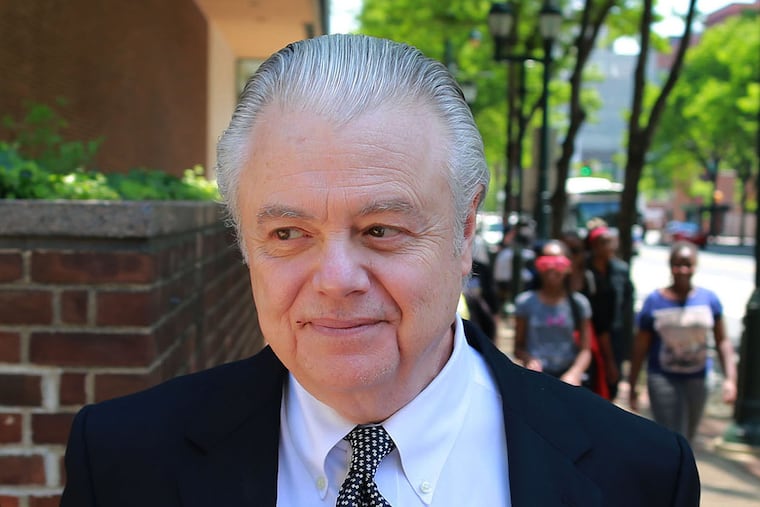Former State Sen. Vince Fumo takes the stand in a tax case in which he’s asked to pay millions
The IRS is demanding back taxes from Fumo tied to his criminal conviction.

Eleven years after former State Sen. Vincent J. Fumo appeared in court on corruption charges, he testified again about those crimes Wednesday in federal tax court as he fought an IRS demand that he pay $3 million in back taxes and penalties.
Fumo told a U.S. Tax Court judge that he never dreamed he would face personal taxes for the millions others were paid for services that the IRS says benefitted him personally and politically.
“I never thought it was me who had to be taxed for it,” Fumo, 79, said on the final day of the three-week civil trial before Judge Albert Lauber.
As he did during his criminal trial, Fumo repeatedly sought to characterize the spending on taxpayer-paid political consultants and others as helping his constituents, not him, and said many of those involved had volunteered to pitch in on their own time.
For example, he said, two of his Senate aides who worked on his 100-acre farm near Harrisburg did so out of their concern for animals.
“I don’t want to be sexist. They were gals,” Fumo said. “They were concerned about the baby goats. They would go out there on their lunch hour.”
He said another aide took care of his finances, paying his utility bills and the like, so he could attend to his role as a legislator.
The IRS wants Fumo to pay back the value of goods and services provided by the state Senate and a South Philadelphia nonprofit he founded, Citizens Alliance for Better Neighborhoods, between 2001 and 2005. The agency filed its demand in 2013 while he was serving a four-prison term and the case languished in the tax court system even before COVID-19 put it on ice for two years.
Lauber, sitting without a jury, will decide how much Fumo must pay. The judge won’t issue his opinion until next summer at the earliest after the IRS and Fumo′s lawyer, Mark Cedrone, have filed a final round of legal arguments. Both the IRS and Fumo have the right to appeal the judge’s decision to the Philadelphia-based Third Circuit Court of Appeals.
The once-powerful politician testified in a courtroom in the U.S. Customs House that was almost empty of spectators. About 10 IRS staffers faced off against Fumo and Cedrone. Fumo last testified in his trial in the federal courthouse on Nov. 10, 2011, before he was resentenced on his 2009 conviction.
The IRS demand is based on Fumo’s sweeping 237-count criminal conviction. The agency called about 35 witnesses to the stand to say he reaped financial benefits by overpaying his Senate staffers while using them as personal servants and campaign foot soldiers, and by hiring taxpayer-paid political consultants and even a private eye to investigate political enemies, an ex-girlfriend, two strippers, and even his own son, among other abuses.
The IRS also wants to fine Fumo for exploiting Citizens Alliance, tapping its money to pay for political polls, a stealth lawsuit against a legislative enemy, tools and consumer goods, and more.
Fumo funded the nonprofit in large part with a $17 million donation from Peco Energy in a deal in which he dropped political opposition to the utility’s business plans. Fumo and Peco kept the payment secret for five years until it was revealed by The Inquirer.
For decades, Fumo, a Democrat, was considered the top lawmaker from Philadelphia to serve in the legislature. He quit his legislative post before his criminal trial. He has kept a relatively low public profile since his conviction.
As part of his sentence, Fumo had to pay about $4.5 million in restitution to his victims. At the time he began his prison sentence, Fumo’s net worth, once estimated at as much as $11 million, had fallen to $3 million, according to court records.
On the stand, Fumo touted his success landing money for Philadelphia, but said he relied on others for his personal finances.
“I know how to pass a bill in the Senate. I know how to bring billions of dollars,” he said. “I don’t know anything about taxes and accounting.”